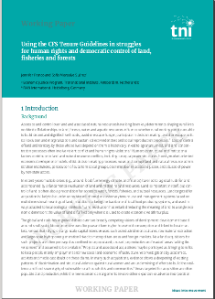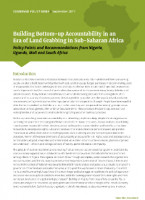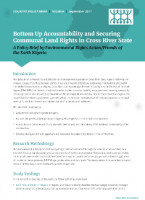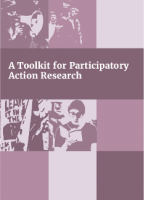Using the CFS Tenure Guidelines in struggles for human rights and democratic control of land, fisheries and forests
Access to and control over land and associated natural resources have long been key determinants shaping rural lives worldwide. Relationships to land, forests, water and aquatic resources influence whether rural working people are able to build decent and dignified livelihoods, avoid or escape hunger, participate in decision-making, avoid or escape political exclusion and marginalization, and sustain collective identities and social reproduction processes.

Descargar PDF
Autores
Loss of control of land and territory by those whose lives depend on them is historically linked to agrarian unrest, and land concentration processes often involve violent conflict and human rights violations. Numerous structural and institutional factors contribute to land and natural resource conflicts, including: unequal power structures, heavily market-oriented economic development models, elitist decision-making processes, weak and corrupt land and natural resource administration institutions, persecution of subaltern social groups, discrimination in access to justice, and abuses of power by non-state actors.
In recent years multiple crises (e.g., around food, fuel/energy, climate, and finance) have led to a global rush for land accompanied by a fundamental revaluation of land and related natural resources. Land is important in itself, but control of land is often also a precondition for access to water, forests, fisheries, and subsoil resources. Land targeted for acquisition is likely to be under unregistered informal or customary tenure use and management systems based on multidimensional meanings of land, in addition to being the backbone of local food producing systems, and used in ways adapted to local ecological contexts. Land revaluation has entailed reducing the meaning of land to a single economic dimension: the value of land is fulfilled only when it is used to create economic wealth/surplus.
The global land rush has reignited debate over two broadly competing visions of development: development based around small-scale, labour-intensive uses like peasant farming for household consumption and linked to local markets, versus that relying on large-scale, capital-intensive uses such as industrial monocultures, raw material extraction and large-scale hydropower generation linked to metropolitan areas and foreign markets. New land acquisitions for such projects are often portrayed as confined to unpopulated, unused, unproductive and ‘wasted’ areas lacking ‘development’ and assumed to be ‘available’. Projects and associated acquisitions may be portrayed as bringing benefits to local people, mainly employment and new social and economic infrastructure. Yet investigations by academics, activists and media cast doubt on these claims. In many such acquisitions, evidence shows a deepening of existing patterns of discrimination and structural violence against rural women and an undermining of efforts to build the resilience and food sovereignty of vulnerable rural households and communities. Areas targeted for acquisition are often populated and productive, while the new economic arrangements involve either expulsion or adverse incorporation ideas into movementof people. People have been expelled when the land is needed but their labour is not; when the land and labour are both needed, they are incorporated into the emerging enterprises as labourers or contract growers, frequently under unfavourable and onerous terms. Either way, a wide range of human rights are violated and/or undermined.
The aspiration for greater state accountability to rural citizens runs deep despite these strong pressures narrowing the space for excluded rural working people to (re)gain effective control of their natural resources. Accountability is about holding those in power responsible for their decisions; accountability politics is about whether and how this can be done. Accountability encompasses rights, rules and procedures that enable citizens to demand answers and sanction misconduct, as well as citizen action to challenge power, claim citizenship and improve and expand democratic processes. Yet neither of these two dimensions of accountability arises out of thin air. Rights, rules and procedures must be formulated, adopted interpreted and implemented, while citizen action must be envisioned, planned, organized and undertaken –oftentimes in hostile political-legal settings marked by major power imbalances and cultures of impunity. Across Africa, public accountability in favour of the recognition, respect, protection and fulfillment of the right to land and natural resources of vulnerable, marginalized and threatened social groups – such as peasants, small-scale and artisanal fishers, herders and pastoralists, and indigenous peoples, women and youth – is scarce. Many legal and extra-legal obstacles exist or emerge along the way to undermine movement forward on either dimension. Large-scale land acquisitions (LSLAs) are being initiated in such settings, making it especially difficult to hold those in power responsible for their decisions.
In examining struggles of movements to claim indigenous rights, Sawyer and Gomez have found that ‘...seeking and acquiring indigenous rights is not, in and of itself, emancipatory. Rather, it recalibrates the arena of struggle.’ The same can be said about the pursuit of a right to land and/or other natural resources. With this in mind, we can ask: How can the Voluntary Guidelines on the Responsible Governance of Tenure of Land, Fisheries and Forests be used by subaltern groups to recalibrate the political-legal terrain in the direction of greater respect for human rights and more democratic land control? The answer is not obvious; the TGs are a soft law instrument and therefore not legally binding. At the same time, even where hard law favourable to the human rights of subaltern groups does exist, state authorities often appear unwilling or unable to respond democratically to citizen demands. The adoption of the TGs presents an opportunity to review why and how they were formulated, and to ‘test’ whether and how they might make a difference in struggles for human rights and democratic land control.


